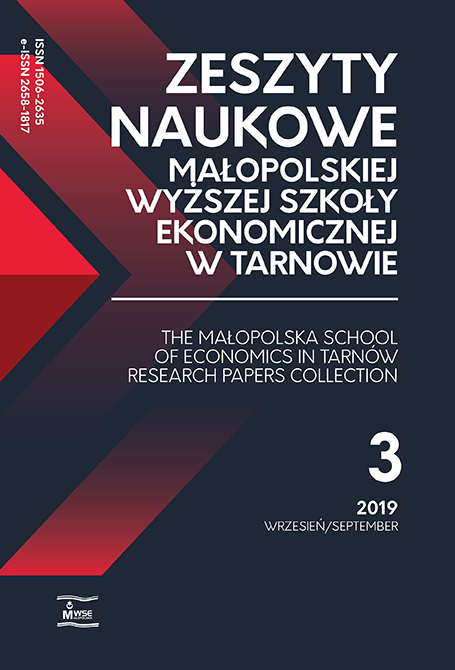Abstract
The article characterizes the specificity of public library activities and their role in education. The possibilities of using e-learning in the education process were also presented, with particular emphasis on public education. Attention was also paid to the growing importance and interest in this type of education. The paper discusses the possibilities of using e-learning in teaching, with particular emphasis on education conducted as part of the activities of public libraries. The article presents the offer of e-learning courses mainly in provincial and pedagogical libraries. The purpose of the analysis was to verify the scope of e-learning use by libraries, check the availability of training offered and the ease of finding them on library websites. The number of courses offered and their topics were also examined. Moreover, it was taken into account to whom the prepared courses were addressed. The paper presents the current state, possibilities for further development and suggestions of the authors, which are based on the growing technological possibilities, with more common access to the Internet. Research shows that the use of e-learning platforms by provincial public and pedagogical libraries is unfortunately not common. This situation may be dictated by the lack of funds to prepare such projects. This limitation should, however, lose its significance due to the decreasing costs of platform implementation as well as the increasing funds supporting library activities. In addition, the pressure of potential users can motivate the development of e-learning platforms in libraries.
References
Burke, J. (2016). Neal-Schuman library technology companion: A basic guide for library staff. 5th ed. Chicago: Neal-Schuman. ISBN 9780838913826.
View in Google Scholar
Hankiewicz, K. (2012). Ocena oferty e-learningowej poznańskich uczelni publicznych. Zeszyty Naukowe Uniwersytetu Szczecińskiego. Ekonomiczne Problemy Usług, 88 (703), 156–164.
View in Google Scholar
Hankiewicz, K., Hankiewicz, M. (2014). Użyteczność serwisów internetowych bibliotek jako cecha determinująca sprawność korzystania z usług bibliotecznych. Zeszyty Naukowe Uniwersytetu Szczecińskiego. Ekonomiczne Problemy Usług, 113 (vol. 2), 21–30.
View in Google Scholar
Hills, H. (2016). Individual preferences in e-learning. Abingdon, Oxon: Routledge. ISBN 9780566084560.
View in Google Scholar
Kozioł, L. (2013). Determinanty rozwoju e-learningu korporacyjnego. Zeszyty Naukowe Uniwersytetu Przyrodniczo-Humanistycznego w Siedlcach. Seria: Administracja i Zarządzanie, 98, 61–72.
View in Google Scholar
Kozioł, M. (2013). Wykorzystanie e-learningu w procesie szkolenia pracowników małych i średnich przedsiębiorstw. Zeszyty Naukowe Małopolskiej Wyższej Szkoły Ekonomicznej w Tarnowie, 22 (1), 113–122.
View in Google Scholar
Kurkowska, E. J. (2012). Platformy e-learningowe w działalności dydaktycznej bibliotek publicznych uczelni akademickich. E-mentor, 4 (46).
View in Google Scholar
Mhouti, A. E., Erradi, M., Nasseh, A. (2018). Using cloud computing services in e-learning process: Benefits and challenges. Education and Information Technologies, 23 (2), 893–909. DOI 10.1007/s10639-017-9642-x.
View in Google Scholar
PBW. (2019). Official website of the Pedagogiczna Biblioteka Wojewódzka im. Komisji Edukacji Narodowej w Warszawie [= Pedagogical Voivodeship Library in Warsaw; online, accessed: 2019-07-12]. Retrieved from: http://www.pbw.waw.pl/.
View in Google Scholar
Plebańska, M., Kula I. (2011). E-learning. Treści, narzędzia, praktyka. Warszawa: ALMAMER Szkoła Wyższa. ISBN 9788362644117.
View in Google Scholar
Pollard, E., Hillage, J. (2001). Explaining e-learning, IES Report nr 376. Brighton: The Institute for Employment Studies. ISBN 1851843051.
View in Google Scholar
Tabot, A., Oyibo, K., Hamada, M. (2013). E-learning evolution: Past, present and future. In: M. Hamada (ed.). E-learning: New technology, applications and future trends (pp. 1–32). New York: Nova Science Publishers. ISBN 9781626189614.
View in Google Scholar
Tangient, L. L. C. (2010). Moodle pros and cons [online, accessed: 2015-04-04]. Retrieved from: http://www. blenderwiki.wikispaces.com/Moodle+Pros+and+Cons.
View in Google Scholar
UCSF Library. (2019). Official website of University of California San Francisco Library [online, accessed: 2019-07-20]. Retrieved from: https://www.library.ucsf.edu/.
View in Google Scholar
Urdan, T. A., Weggen, C. (2000). Corporate e-learning: Exploring a new frontier [online, accessed: 2019-07-20]. WR Hambrecht and Co. Retrieved from: http://cclp.mior.ca/Reference%20Shelf/PDF_OISE/Corporate%20e-learning.pdf.
View in Google Scholar
WBPiCAK. (2019). Official website of the Wojewódzka Biblioteka Publiczna i Centrum Animacji Kultury w Poznaniu [= Voivodeship Public Library and Culture Animation Center in Poznań; online, accessed: 2019-07-04]. Retrieved from: http://wbp.poznan.ekursy.eu.
View in Google Scholar
© Copyright by Małopolska School of Economics in Tarnów. The articles are available under the Creative Commons Attribution NonCommercial-NoDerivatives 4.0 International License


